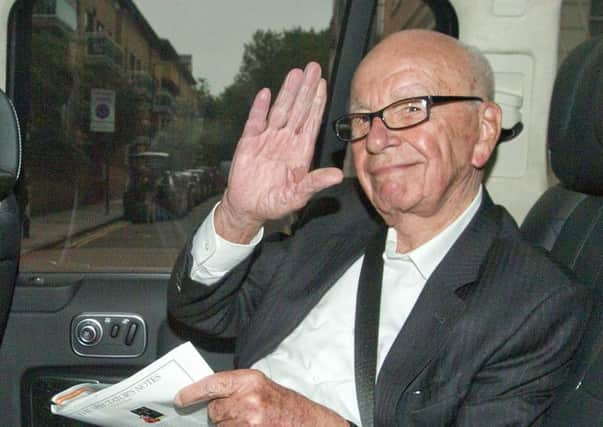Darren '˜Loki' McGarvey: Media still influencing our politics


Most of us, whether we realise it or not, form a worldview through interactions with the media.
However, many in media don’t believe they are shaping our opinions, but rather, benevolently reflecting them. I’m one of many who disagrees with the notion that the press has no role in shaping public opinion and while I do not take the view that the ‘MSM’ is a monolithic conspiracy, I do believe some broadcasters and papers hold a disproportionate level of influence over politics and that it is naïve – and disingenuous – to suggest otherwise.
Advertisement
Hide AdAdvertisement
Hide AdThe first big clue can be found in politicians’ willingness to carry favour with certain publications; Blair and Salmond cosying up to Murdoch; May wining and dining the Daily Mail’s Paul Dacre prior to Brexit negotiations; Sturgeon writing for the Daily Record, and posing on the front page of the Scottish Sun. It appears party leaders understand perfectly well the decisive role newspapers play in shaping the attitudes and opinions of voters. So why do some in media recoil at the mere suggestion they may play more than a benign role in regimenting the public mind?
On 11 April 1992 , the Sun newspaper - Britain’s biggest selling daily – ran its infamous headline “It’s the Sun Wot Won It” the morning after the UK General Election. A sceptic may infer, from this subtle piece of journalism, that the tabloid either regarded itself as kingmaker or wanted to create a perception of itself as such. In this case, the Sun was taking credit for getting John Major elected; extending the Conservative Party’s Vulcan death-grip on British politics for another five years.
Then, of course, the Sun famously ditched the Tories for “Tony”, who won power in a historical landslide and enjoyed generous support from the newspaper for the duration of his tenure – even when ‘public opinion’ appeared to be against many of his policies – including a certain legally ambiguous war he was championing.
Rupert Murdoch, owner of The Sun, would later claim that “the media does not have this kind of power”, meaning, of course, that papers don’t play a significant role in shaping attitudes and opinions. But is Murdoch, who made Tony Blair godfather to his own daughter, really the best person to ask?
Are people in media, bless them, really the people we should be consulting when we want an objective analysis of the role of media? Would a journalist, for example, be satisfied if it fell to politicians, footballers or criminals to write their own appraisals?
The view that attributing shifts in public opinion to media is patronising is widely held by people in media, who see themselves as public servants; intrepid carrier pigeons delivering unfiltered truth-bombs directly to your limbic-system. Just like the notion players aren’t overpaid is widely held in football and the notion politicians aren’t hypocritical liars is widely held in parliament, people in media tend to minimise the pernicious aspects of their profession. But you must be a special sort of hack to not only deny the influence of media on public opinion but to glibly dismiss the suggestion it exists, at all, as patronising or paranoid.
If the public is all-knowing and cannot have its wisdom questioned then what about all the people who believe the media does, in fact, play a role in shaping public opinion? Are we not patronising them too by suggesting they could be misinformed? I mean, where does the debate end?
It ends when we can establish facts.
It’s estimated that the Sun’s decision to change party allegiance generated 525,000 votes for the Labour party in 1997 and about 550,000 votes for the Conservative party in 2010. Let’s not forget that when the Sun came out for the Labour Party in 1997 it was a bit of a shock to many at the time.
Advertisement
Hide AdAdvertisement
Hide AdJust five years earlier, in 1992, when polls suggested Neil Kinnock would win the election, the Sun came out swinging for Major, who then won. If Kinnock was ahead in public opinion polls in 1992 and people were shocked about the paper’s support for Blair in 1997, then whose opinion was the Sun reflecting? Both cases show the Sun’s editorial position arguably running against public attitudes and, therefore, undermine the claim its editorial position is a mere effect – and not cause – of sections of public opinion.
What’s more telling is that these decisions, to switch party allegiance in 1992 and 1997, likely came from Murdoch himself and were the product of his own personal views and interests; according to testimony from the Leveson Enquiry, Blair met Murdoch on numerous occasions before the 1997 election and was swayed to support Labour after a two-year “courting” period.
In 1995, when Blair flew out to a News Corporation conference as a guest speaker, the Australian media tycoon joked: “If the British press is to be believed, today is all part of a Blair-Murdoch flirtation. If that flirtation is ever consummated, Tony, I suspect we will end up making love like two porcupines – very carefully.” And what a fiendish union it turned out to be, but worry not plebs, these powerful people are just trying to give you, the great unheard, a voice in the clamour – aye right, give me a break, mate.
Most journalists accept the premise that the public can be manipulated by politicians, like Blair, May or Sturgeon, so why then is the suggestion that sections of the media could do the same so offensive to some?